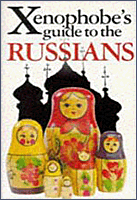






Contents:
 |
|||||
There is a saying in Russia: "Nothing is permitted, but everything is possible". This more or less sums up the Russians' attitude to rules and regulations of all kinds: they are there to be bent, broken, evaded or ignored. For example, it irritates Russians profoundly if their passenger fastens his seatbelt. The fact is that there is virtually no reliably-interpreted system of law in Russia at present. Basically, the thing to remember with Russians is that everything is negotiable and can usually be resolved, if necessary by resorting to the time-honoured device of the offer of a bribe. A bribe is not always needed. A young Scottish music student discovered prior to her departure from Moscow recently that her passport had not been stamped by her hosts in Tver, a provincial city some three hours away. In Moscow she was warned that, without proof of her stay, she would not be allowed to leave.
Frantic with worry, and by now in tears, she was taken to a police station where her case was explained. "What were you doing in Tver?" the militiaman demanded. "I was learning some Russian repertoire - I am a singer" she stammered. His expression remained stony. "If you're a singer, then sing me something." She cleared her throat and gave him a full-throttle burst of Rachmaninov. As he listened, a dreamy look came into his eyes. He turned away, apparently troubled by a speck of dust in one eye, coughed and straightened his uniform before saying sternly "I'm afraid there is no question of us allowing a beautiful voice like that to leave the country." Then he smiled, fined her the equivalent of 50p and gave her back the arrest warrant as well as her passport as a souvenir.
- The Police
Russian police on the whole are poorly paid, trained and equipped, and often physically unsuited to the job. Until very recently there was no system of selection - anyone mug enough could join the force. Foreign residents and Russian citizens alike have many tales to tell about the arbitrary "motoring fines" levied by free-lancing policemen. Now, higher standards are being promised with better conditions of work and pay. The Russians specialise in horrible axe murders and members of rival gangs often have machine-gun battles in the street. Most people favour capital punishment. It is said that when a Russian prisoner is sentenced to death and his appeal has been heard and turned down, he is moved to a special cell and allowed to wear special clothes and is given quite nice food. Then, one day, two prison officers appear at the cell door and invite him to follow them down the corridor. As he walks along, ignorant of his impending doom, a marksman takes aim from behind a half-open door and shoots him dead.
Prison conditions vary widely. Most are appalling, with pointlessly brutal warders. There are two "luxury" prisons in Moscow, Lefortovo and Matrosskaya Tishina (literally: the Seaman's Rest). These are nicely furnished with good cuisine for prisoners such as the leaders of the unsuccessful coup of August 1991 and the equally unsuccessful leaders of Parliament who staged a sit-in and then an armed assault on the radio and television station and Moscow City Council offices in October 1993. There are said to be underground passages from the Kremlin to these two prisons, to make interrogation easier.
2009 ╘ All rights reserved. Designed by TatkaCo: tania@email.it
